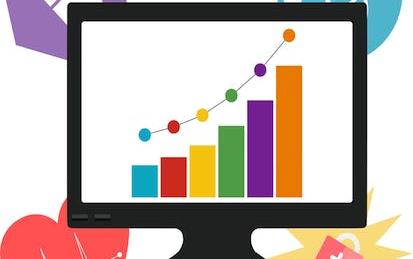

دوراتنا

The Social and Technical Context of Health Informatics
Improving health and healthcare institutions requires understanding of data and creation of interventions at the many levels at which health IT interact and affect the institution. These levels range from the external “world” in which the institution operates down to the specific technologies. Data scientists find that, when they aim at implementing their models in practice, it is the “socio” components that are both novel to them and mission critical to success.
-
Course by

-
 Self Paced
Self Paced
-
 9 ساعات
9 ساعات
-
 الإنجليزية
الإنجليزية

Skills for Nursing Informatics Leaders
In this first of our five courses, Dr.
-
Course by

-
 Self Paced
Self Paced
-
 18 ساعات
18 ساعات
-
 الإنجليزية
الإنجليزية

Introduction to Reproducibility in Cancer Informatics
The course is intended for students in the biomedical sciences and researchers who use informatics tools in their research and have not had training in reproducibility tools and methods. This course is written for individuals who: - Have some familiarity with R or Python - have written some scripts. - Have not had formal training in computational methods.
-
Course by

-
 Self Paced
Self Paced
-
 8 ساعات
8 ساعات
-
 الإنجليزية
الإنجليزية

The Data Science of Health Informatics
Health data are notable for how many types there are, how complex they are, and how serious it is to get them straight. These data are used for treatment of the patient from whom they derive, but also for other uses. Examples of such secondary use of health data include population health (e.g., who requires more attention), research (e.g., which drug is more effective in practice), quality (e.g., is the institution meeting benchmarks), and translational research (e.g., are new technologies being applied appropriately).
-
Course by

-
 Self Paced
Self Paced
-
 10 ساعات
10 ساعات
-
 الإنجليزية
الإنجليزية

Leading Change in Health Informatics
Do you dream of being a CMIO or a Senior Director of Clinical Informatics? If you are aiming to rise up in the ranks in your health system or looking to pivot your career in the direction of big data and health IT, this course is made for you. You'll hear from experts at Johns Hopkins about their experiences harnessing the power of big data in healthcare, improving EHR adoption, and separating out the hope vs hype when it comes to digital medicine.
-
Course by

-
 Self Paced
Self Paced
-
 15 ساعات
15 ساعات
-
 الإنجليزية
الإنجليزية

Introduction to Neurohacking In R
Neurohacking describes how to use the R programming language (https://cran.r-project.org/) and its associated package to perform manipulation, processing, and analysis of neuroimaging data. We focus on publicly-available structural magnetic resonance imaging (MRI).
-
Course by

-
 Self Paced
Self Paced
-
 18 ساعات
18 ساعات
-
 الإنجليزية
الإنجليزية

Advanced Reproducibility in Cancer Informatics
This course introduces tools that help enhance reproducibility and replicability in the context of cancer informatics. It uses hands-on exercises to demonstrate in practical terms how to get acquainted with these tools but is by no means meant to be a comprehensive dive into these tools. The course introduces tools and their concepts such as git and GitHub, code review, Docker, and GitHub actions. Target Audience The course is intended for students in the biomedical sciences and researchers who use informatics tools in their research.
-
Course by

-
 Self Paced
Self Paced
-
 10 ساعات
10 ساعات
-
 الإنجليزية
الإنجليزية

Nursing Informatics Training and Education
In this fourth of our five courses, I will go deeper into the training and education leadership skills that are helpful for nursing informatics leaders. I will also guide you through the process of preparing a course document or syllabus for the nursing informatics specialty both in academic settings and in practice or industry. Following are the course objectives: 1. Describe relevant nursing informatics course development in clinical and academic settings to understand similarities and differences in informatics teaching and education across settings. 2.
-
Course by

-
 Self Paced
Self Paced
-
 21 ساعات
21 ساعات
-
 الإنجليزية
الإنجليزية

Culminating Project in Health Informatics
This capstone course in the Health Informatics Specialization will allow learners to create a comprehensive plan for an informatics intervention of their choosing, and that will demonstrate to current or future employers the new skills obtained through the completion of this series of five courses in Health Informatics.
-
Course by

-
 Self Paced
Self Paced
-
 15 ساعات
15 ساعات
-
 الإنجليزية
الإنجليزية

Nursing Informatics Leadership Theory and Practice
“By the end of this Course, you will be able to…” • Evaluate effective leadership styles for leadership in nursing informatics in clinical or academic contexts to improve leadership success. • Discover core values that support effective nursing informatics leadership in academic and clinical contexts to inform development of a personal leadership mission statement. • Discover competing values and polarities related to knowledge leadership and management to promote successful leadership collaboration. • Determine your personal informatics leadership style based on results from the Minnesota In
-
Course by

-
 Self Paced
Self Paced
-
 19 ساعات
19 ساعات
-
 الإنجليزية
الإنجليزية

Social Determinants of Health: Methodological Opportunities
This fourth of five courses examines the methodological approaches and research tools that inform our understanding of best practices in working with science teams, communities, and with data. The topics of this course include: 1. Community-Based Participatory Research 2. Team Science 3. Community-Level Data 4. Informatics and the Social Determinants of Health: Knowledge Management 5. Data Applications: ANOVA Analysis and Line Graph Visualization
-
Course by

-
 Self Paced
Self Paced
-
 18 ساعات
18 ساعات
-
 الإنجليزية
الإنجليزية

Computing for Cancer Informatics
One of the key cancer informatics challenges is dealing with and managing the explosion of large data from multiple sources that are often too large to work with on typical personal computers. This course is designed to help researchers and investigators to understand the basics of computing and to familiarize them with various computing options to ultimately help guide their decisions on the topic.
-
Course by

-
 Self Paced
Self Paced
-
 12 ساعات
12 ساعات
-
 الإنجليزية
الإنجليزية

Introduction to High-Throughput Materials Development
This course is an introduction to high-throughput experimental methods that accelerate the discovery and development of new materials. It is well recognized that the discovery of new materials is the key to solving many technological problems faced by industry and society. These problems include energy production and utilization, carbon capture, tissue engineering, and sustainable materials production, among many others. This course will introduce the learner to a remarkable new approach to materials discovery and characterization: high-throughput materials development (HTMD).
-
Course by

-
 Self Paced
Self Paced
-
 16 ساعات
16 ساعات
-
 الإنجليزية
الإنجليزية

The Outcomes and Interventions of Health Informatics
For clinical data science to be effective in healthcare—to achieve the outcomes desired—it must translate into decision support of some sort, either at the patient, clinician, or manager level. By the end of this course, students will be able to articulate the need for an intervention, to right size it, to choose the appropriate technology, to describe how knowledge should be obtained, and to design a monitoring plan.
-
Course by

-
 Self Paced
Self Paced
-
 7 ساعات
7 ساعات
-
 الإنجليزية
الإنجليزية

Epidemics I
Explore the science, prevention and control of epidemics in this free online course. In addition to lectures by leading scientists in this field from HKU, this course will feature a supplementary module on COVID-19 and panel discussions with world-leading experts in epidemics.
This is the first (origins of novel pathogens) of the four courses, covers these topics:
-
Course by

-
 الإنجليزية
الإنجليزية

Clinical Data Science
Are you interested in how to use data generated by doctors, nurses, and the healthcare system to improve the care of future patients? If so, you may be a future clinical data scientist! This specialization provides learners with hands on experience in use of electronic health records and informatics tools to perform clinical data science.
-
Course by

-
 Self Paced
Self Paced
-
 الإنجليزية
الإنجليزية

Nursing Informatics Leadership
Nurses and interprofessional healthcare clinicians and educators will learn principles of informatics leadership in clinical and academic settings, and apply their learning to real world scenarios in practice and training/education environments.
-
Course by

-
 Self Paced
Self Paced
-
 الإنجليزية
الإنجليزية

Recovering the Humankind's Past and Saving the Universal Heritage
Archaeology is, among human sciences, the discipline with the strongest importance for the rediscovery, but also for the preservation and protection of cultural heritage, as Humankind’s universal patrimony. You will be introduced to the way we ourselves reflect on and are engaged with the study of human past: from the practical and material recovery of ancient traces in the field to the study and interpretation.
-
Course by

-
 Self Paced
Self Paced
-
 14 ساعات
14 ساعات
-
 الإنجليزية
الإنجليزية

Health Informatics
This Specialization is intended for health professionals, administrators, health IT staff, vendors, startups, and patients who need or want to participate in the health IT/informatics process. Throughout the five courses of this Specialization, you will learn about the social and technical context of health informatics problems, how to successfully implement health informatics interventions, how to design a health informatics solution for decision support, and how to answer a health informatics problem through data retrieval and analysis.
-
Course by

-
 Self Paced
Self Paced
-
 الإنجليزية
الإنجليزية

Healthcare Data Management and Information Systems
This course is the continuation of the Health Informatics for Healthcare Professionals course. If you have not yet taken the introductory course, it is recommend that you complete that course prior to this course. The foundational knowledge from the introduction is carried through in this deeper dive into informatics in healthcare. In this course, you will have an opportunity to explore concepts and topics related to the design and management of health information systems.
-
Course by

-
 Self Paced
Self Paced
-
 16 ساعات
16 ساعات
-
 الإنجليزية
الإنجليزية

Introduction to Information Systems for Business
This Specialization is for learners seeking to develop skills in information systems. Through each course, learners will apply knowledge and skills to solve problems in their field (e.g., health informatics, legal, project management, customer experience/marketing, finance).
-
Course by

-
 Self Paced
Self Paced
-
 الإنجليزية
الإنجليزية

Leadership in Interprofessional Informatics
In this course, students in the health and information technology professions will examine models for interprofessional collaboration and teamwork, practice communication techniques to promote effective interaction, and envision futures literacy in interprofessional informatics scenarios. We will hear from nurses and other informaticians who are leading and working interprofessionally, and glean insights from their diverse perspectives.
-
Course by

-
 Self Paced
Self Paced
-
 28 ساعات
28 ساعات
-
 الإنجليزية
الإنجليزية

Data Analytics and Visualization in Health Care
Learn best practices in data analytics, informatics, and visualization to gain literacy in data-driven, strategic imperatives that affect all facets of health care.
-
Course by

-
 الإنجليزية
الإنجليزية

Healthcare Analytics and Decision Making
Healthcare leaders deal with important challenges that can affect public health. Learn about health informatics solutions and financial systems needed to manage planning, quality assurance, risk management, and evidence-based decision-making.
-
Course by

-
 45
45
-
 الإنجليزية
الإنجليزية

Health Informatics Technology in Population Healthcare Analytics
Explore health informatics solutions that answer population health challenges.
-
Course by

-
 100
100
-
 الإنجليزية
الإنجليزية



